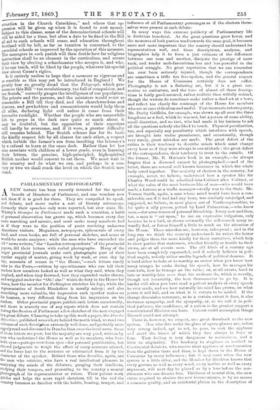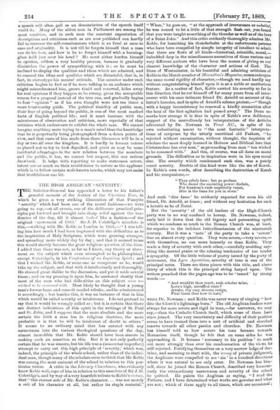PARLIAMENTARY PIIOTOGRAPHY.
A. NEW torture has been recently invented for the special benefit of Members of Parliament, and one wonders now and then if it is good for them. They are compelled to speak, and debate, and move under a sort of literary microscope. Formerly their speeches only were reported, but ever since Mr. Whitty's Stranger in Parliament made such a sensation, a habit of personal observation has grown up, which becomes every day more searching and minute, and must make many members feel as if they were in the position of poets receiving unknown American visitors. Magazines, newspapers, ephemera's of every kind, and even books, are full of personal sketches, and acute or would-be acute analyses; while the men who have succeeded the old "news writers," the "Loudon correspondents" of the provincial Papers, fill their letters with verbal photographs. Many of the larger provincial journals make such photographs part of their regular supply of matter, giving week by week, or even day by day, accounts of scenes in " the House,"—such letters rarely refer to the Peers,—written by eye-witnesses who can tell their readers how members looked as well as what they said, when they laughed, and when they frowned, how they expanded under cheers, and wriggled under the "Oh ! ohs !" which do duty in the House for hisses, how the member for Pedlington stretches his legs, while the representative of South Blankshire is usually asleep ; and also something more valuable, the impression each speaker makes ou his hearers, a very different thing from his impression on his readers. Other provincial papers publish such letters occasionally, and there is scarcely one of any repute which does not contain during the Session of Parliament a few sketches of the men engaged us a great debate. Chancing to take up this week a paper, the Dundee Advertiser, published somewhere behind the north wind, we read two columns of such description extremely well done, and probably snore eagerlyread and discussed in Dundee than even the local news. Some of these letters are poor, but the majority are very good, written by men who understand the House as well as its members, who have keen eyes—perhaps over-keen eyes—for personal peculiarities, but shrewd judgments to weigh the effect of every sentence uttered, and the force lent to the sentence or subtracted from it by the character of the speaker. Behind those who describe, again, are the men who criticize, who have a real intellectual pleasure in analyzing the minds of the debaters, guagiug their intellects, Studying their tempers, and presenting to the country a mental Photograph of its representatives or rulers. Their patient work guides and helps the more rapid sketchers, till in the end the country becomes as familiar with the habits, bearing, temper, and
influence of all Parliamentary personages as if the electors themselves were present at each debate.
In many ways this extreme publicity of Parliamentary life is doubtless beneficial. As the great questions grow fewer, and the measures of both parties tend towards the same goal, it becomes more and more important that the country should understand its representatives well, and these descriptions, analyses, and biographies help it to form a just estimate of the difference between one man and another, dissipate the prestige of were rank, and render mob-favouritism less and less powerful in the political struggle. No great reputation that we can remember has ever been seriously injured, though the correspondents are sometimes a trifle too free-spoken, and the general respect for the House of Commons certainly does not suffer. Photography is not a flattering art, but it is a great corrective to caricature, and the tone of almost all these descriptions is fairly good-natured, rather realistic than wilfully unkind, though the writers do sometimes snake rather a dead set at a bore, and reflect too closely the contempt of the House for members who are at once ridiculous and useful. That incarnate interrogatory, Mr. Darby Griffiths, for example, was shown up all over the three kingdoms as a fool, which he was not, but a person of some ability, small discretion, and no tact, who had made it his business to ask all the questions nobody else liked to touch. Physical peculiarities, too, and especially any peculiarity which interferes with speech, arc brought into undue prominence, and occasionally, though very rarely, great mistakes are made. The great defect of the critics is their tendency to describe minds which must change every hour as if they were always in one attitude ; the great defect of the correspondents, their tendency to trust to the outside. Of the former, Mr. It. Hutton's book is an example,—he always forgets that a diamond cannot be photographed ;—and of the latter, there are several well known instances iu which the whole body erred together. The majority of electors in the country, for example, never, we believe, understood how a speaker like Sir Charles Wood could be admitted into Cabinet after Cabinet, or what the value of the most business-like of men—who would have wade a fortune as a traffic massager—really was to the State. Mr. Vernon Smith, again, a man whose mind would have been a considerable one if it had had any bone, was similarly misjudged, and supposed, we believe, in most places out of Northamptonshire, to be quite a silly person, petted by Lord Palmerston,—who knew men,—for some reason of personal friendship. Every now and then, too, a man is " sat upon," to use an expressive vulgarism, only because he is a lord, or shows outwardly the self-conceit many inwardly feel, or forces himself a little to much on the attention of the Kruse. These mistakes arc, however, infrequent ; and in the long run we think the country understands its rulers the better and judges them the more kindly for these narratives, which help to show parties that statesmen, whether friendly or hostile to their views, are at all events men. The old libels of a century ago have been completely superseded, and if nobody believes in political angels, nobody either credits legends of political demons. It is hard either to hate or to worship an orator when you know how many oranges he sucks during his speech, how he massages his coat-tails, how he thumps on the table ; or, at all events, hard to hate or worship him more than his audience do, which is usually, though not invariably, the best thermometer to go by. It is harder still when you have read a patient analysis of every speech he ever made, and see how naturally his mind has grown, on what points it will fail, and on what it is certain to be misled. If the change diminishes reverence, as to a certain extent it does, it also increases sympathy, and the sympathy, or, as we call it in political parlance, the confidence, of a nation is the greatest support a constitutional Minister can have. Cavour could accomplish things Iticasoli could not attempt.
There is, however, we suspect, one great drawback to the new system. Men who live under the glare of opera-glasses are, unless very strong indeed, apt to act, to pose, to seek the applause and avoid the hisses of which they live always in hope or fear. That feeling its very dangerous to naturalness, and a little to originality. The tendency to staginess so Marked in Continental debaters, who receive their applause or condemnation from the galleries there and then, is kept down in the House of Commons by many influences ; but it may come when the new system is a little older, and the Member for Blackton knows that every gesture as well as every word, every motive as well as every argument, will next day be placed as by a lens before the constituents who can dismiss him. Thickness of mental skin, the new virtue required to obviate the new inconvenience, is by no means a common quality, and an accidental phrase in the description of
a speech will often gall as no denunciation of the speech itself could do. Many of the ablest men in Parliament are among the most sensitive, and in such men the constant expectation of descriptions and criticisms such as are now published can hardly fail to increase the self-consciousness which is so fatal at once to ease and originality. It is not till he forgets himself that a man can do his best, and how is he to forget himself with a burningglass held just over his head ? He must either harden himself to opinion, seldom a very healthy process, because it gradually diminishes the power of sympathizing with it; or he must be inclined to display the qualities and ideas which are admired, and to conceal the ideas and qualities which are distasteful, that is, in fact, to stereotype his mental attitude. The member under such criticism begins to feel as if he were talking to an audience which might misunderstand him, grows timid and reserved, hides away his real opinions if they happen to be strong, gives the acceptable reason for a proposal instead of the true one, and gradually begins to fear " opinion " as if his own thought were not ten times a more trustworthy guide. The political timidity of public men, their fear of going beyond the public, is one of the most marked facts of English political life ; and it must increase with the minuteness of observation and criticism, more especially of that criticism which endeavours to exhibit the whole man. We cannot imagine anything more trying to a man's mind than the knowledge that he is perpetually being photographed from a dozen points of view, and that casts of him made from those likenesses will be in a day or two all over the kingdom. It is hardly in human nature so placed not to try to look dignified, and great as may be some incidental advantages in the new relation between the members and the public, it has, we cannot but suspect, this one serious drawback. It helps with reporting to make statesmen actors, intent not so much on their truthfulness to nature as the applause which is to follow certain well-known touchs, which may not assist that truthfulness one bit.



































 Previous page
Previous page